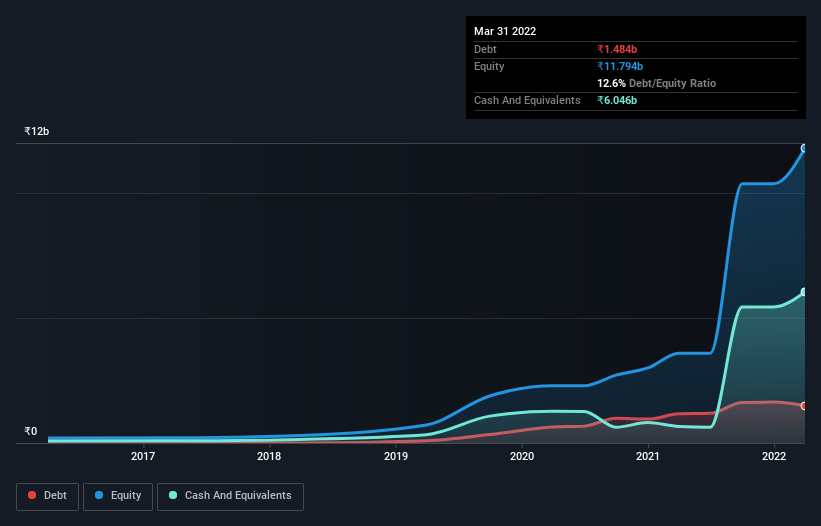David Iben put it well when he said, 'Volatility is not a risk we care about. What we care about is avoiding the permanent loss of capital.' So it might be obvious that you need to consider debt, when you think about how risky any given stock is, because too much debt can sink a company. We can see that Affle (India) Limited (NSE:AFFLE) does use debt in its business. But should shareholders be worried about its use of debt?
When Is Debt A Problem?
Debt assists a business until the business has trouble paying it off, either with new capital or with free cash flow. Ultimately, if the company can't fulfill its legal obligations to repay debt, shareholders could walk away with nothing. However, a more frequent (but still costly) occurrence is where a company must issue shares at bargain-basement prices, permanently diluting shareholders, just to shore up its balance sheet. By replacing dilution, though, debt can be an extremely good tool for businesses that need capital to invest in growth at high rates of return. When we think about a company's use of debt, we first look at cash and debt together.
See our latest analysis for Affle (India)
How Much Debt Does Affle (India) Carry?
The image below, which you can click on for greater detail, shows that at March 2022 Affle (India) had debt of ₹1.48b, up from ₹1.17b in one year. However, it does have ₹6.05b in cash offsetting this, leading to net cash of ₹4.56b.

How Strong Is Affle (India)'s Balance Sheet?
According to the last reported balance sheet, Affle (India) had liabilities of ₹4.29b due within 12 months, and liabilities of ₹2.19b due beyond 12 months. Offsetting these obligations, it had cash of ₹6.05b as well as receivables valued at ₹3.12b due within 12 months. So it actually has ₹2.69b more liquid assets than total liabilities.
Having regard to Affle (India)'s size, it seems that its liquid assets are well balanced with its total liabilities. So while it's hard to imagine that the ₹140.2b company is struggling for cash, we still think it's worth monitoring its balance sheet. Simply put, the fact that Affle (India) has more cash than debt is arguably a good indication that it can manage its debt safely.
In addition to that, we're happy to report that Affle (India) has boosted its EBIT by 64%, thus reducing the spectre of future debt repayments. When analysing debt levels, the balance sheet is the obvious place to start. But ultimately the future profitability of the business will decide if Affle (India) can strengthen its balance sheet over time. So if you're focused on the future you can check out this free report showing analyst profit forecasts.
Finally, while the tax-man may adore accounting profits, lenders only accept cold hard cash. Affle (India) may have net cash on the balance sheet, but it is still interesting to look at how well the business converts its earnings before interest and tax (EBIT) to free cash flow, because that will influence both its need for, and its capacity to manage debt. Over the most recent three years, Affle (India) recorded free cash flow worth 62% of its EBIT, which is around normal, given free cash flow excludes interest and tax. This cold hard cash means it can reduce its debt when it wants to.
Summing up
While it is always sensible to investigate a company's debt, in this case Affle (India) has ₹4.56b in net cash and a decent-looking balance sheet. And we liked the look of last year's 64% year-on-year EBIT growth. So we don't think Affle (India)'s use of debt is risky. Another factor that would give us confidence in Affle (India) would be if insiders have been buying shares: if you're conscious of that signal too, you can find out instantly by clicking this link.
At the end of the day, it's often better to focus on companies that are free from net debt. You can access our special list of such companies (all with a track record of profit growth). It's free.
New: Manage All Your Stock Portfolios in One Place
We've created the ultimate portfolio companion for stock investors, and it's free.
• Connect an unlimited number of Portfolios and see your total in one currency
• Be alerted to new Warning Signs or Risks via email or mobile
• Track the Fair Value of your stocks
Have feedback on this article? Concerned about the content? Get in touch with us directly. Alternatively, email editorial-team (at) simplywallst.com.
This article by Simply Wall St is general in nature. We provide commentary based on historical data and analyst forecasts only using an unbiased methodology and our articles are not intended to be financial advice. It does not constitute a recommendation to buy or sell any stock, and does not take account of your objectives, or your financial situation. We aim to bring you long-term focused analysis driven by fundamental data. Note that our analysis may not factor in the latest price-sensitive company announcements or qualitative material. Simply Wall St has no position in any stocks mentioned.
About NSEI:AFFLE
Affle 3i
Provides mobile advertisement services through information technology and software development services for mobiles in India and internationally.
Flawless balance sheet with solid track record.
Similar Companies
Market Insights
Community Narratives



